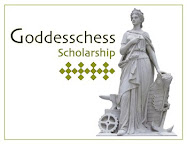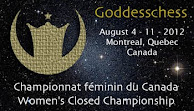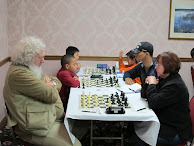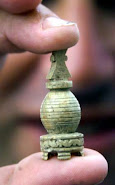Tuesday, March 11, 2008
Kingship: Abishag and the King
From Barbara Walker's The Woman's Encyclopedia of Myths and Secrets:
Abishag
The Bible claims the maiden Abishag was chosen for her beauty, to engender "heat" in the aged King David (1 Kings 1:2). This "heat" was not mere warmth, but the sacred fire of sexual potency, without which no king could be allowed to rule. [Side note: I wonder if this was also part of the test in the Egyptian heb sed festival?] If an impotent king were kept in office, his land would become barren. Hence, when David failed to "know" Abishag, a more virile prince (Adonijah) immediately prepared to assume the throne, and "exalted himself, saying, I will be king" (1 Kings 1:5). David's death occurred with sugggestive promptness after his failure of the virility test.
Abishag's name might be related to the Hindu abhiseka ceremony, the annointing of kings with the sacred fluid of the Goddess Sarasvati.(1) From China to the Mediterranean, ancient kings derived their legitimation from a mating with the Goddess through her priestess-surrogate.(2) Mesopotamian kings and their deified souls, the gods, were constantly described as "beloved" of the Goddess known as creatress of the earth and "maker of fate, she who decrees the fate of the men and gods."(3) Like the eastern Goddess, Abishag represented the land in the same way as Solomon's bride, whose mating was chronicled in the requisite intimate detail by the Song of Solomon.
After David's death, the queen mother chose between rival candidates Solomon and Adjonijah. She crowned Solomon with her own hands (Song of Solomon 3:11), after the custom of the royal women whose business it was to ehthrone or depose kings, as in India, Egypt, and the lands of the Fertile Crescent.(4) However, Adonijah still had designs on the throne, as shown by his request for the hand of Abishag in marriage. To prevent this symbolically and politically significant marriage form taking place, Solonon had Adonijah murdered (1 Kings 2:17-25). The Bible fails to explain Solomon's strangely violent reactin to Adonijah's request; but it can only have meant that the crown was at stake. This in turn shows that a sexual union with Abishag was a prerequisite for royal office. See Kingship.
Notes:
(1) Gaster, 514.
(2) Boulding, 191.
(3) Pritchard, A.N.E. 1, 65; 2, 17, 21, 135, 202.
(4) Boulding, 210.
************************************************************************************
Solomon's mother, Bathsheba, had entered into an adulterous affair with King David while her husband was off fighting one of David's foreign wars. When Bathsheba became pregnant, David schemed to have Bathsheba's husband killed and he then took her as one of his wives. Their first child - a son - died - supposedly as punishment by Yahweh for David's adultery - thereby proving the biblical adage "the sins of the fathers are visited upon the sons." Of course, there is no way to reconcile this harsh divine judgment upon an innocent baby when Yahweh is also supposed to be a merciful and just god, kind to widows and orphans and the foreign resident in the midst of his people.
Abishag was the goddess' representative and her intercourse with the king (or future king) was crucial to justifying his reign. If the goddess should withdraw her favor from the king, havoc would rule and the king could be (and sometimes was) overthrown in favor of a more likely candidate, one upon whom the goddess might smile. This casts new light to the importunings of some of the Pharaohs of Egypt recorded in ancient prayers inscribed on monuments for the flooding of the Nile to occur. We in the west often assume that the flooding of the Nile occurs every year like clockwork; but prior to the construction of the modern-day dams along the Nile, that annual flooding did not always occur. When it did not, famine stalked the land. Who was to blame for such a catastrophy? Pharoah, who had lost the favor of the great mother Goddess, she withdrawing her favor - literally - from the land and cursing its crops to whither and die.
Now, there's some interesting stuff under Kingship in Walker's Encylopedia. I recall that we often speculated about and did much research about substitute king sacrifice in The Weave (preserved at Goddesschess). Walker brings an entirely new light to the subject for me. Wow!
Subscribe to:
Post Comments (Atom)



































No comments:
Post a Comment